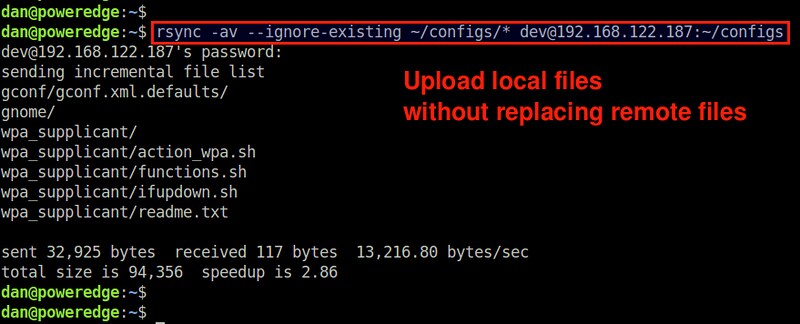http://ask.xmodulo.com/skip-existing-files-scp.html
In another similar situation, you may want to upload local files to a remote site, but without replacing any remote files.
Here are a few ways to skip existing files when transferring files with scp.
In this case, you need to explicitly tell rsync to "skip" any existing files during sync. Otherwise, rsync will try to use file modification time to sync two hosts, which is not what you want.
To download all remote files (over SSH) while skipping existing local files:

Here is how to scp files without replacing existing files using ACL tools.
To download all remote files (over SSH) while skiping existing local files:
Download this article as ad-free PDF (made possible by your kind donation):
Question: I want to download (or upload) files from (or to) a remote server using the scp command. In this case, I want to skip existing files, so that they will not get overwritten by scp. But the scp
command would blindly overwrite existing files if the same name files
exist at either host. How can I copy files over without overwriting
existing files, so that only new files are downloaded (or uploaded) by scp?
Suppose you have a list of files on a remote host, some of which
already exist locally. What you want is to transfer only those files
that are not found locally. If you blindly run scp with
wildcard, it would fetch all remote files (existing as well as
non-existing files), and overwrite existing local files. You want to
avoid this.In another similar situation, you may want to upload local files to a remote site, but without replacing any remote files.
Here are a few ways to skip existing files when transferring files with scp.
Method One: rsync
If the local and remote hosts have rsync installed, using rsync will be the easiest way to copy only new files over, since rsync is designed for incremental/differential backups.In this case, you need to explicitly tell rsync to "skip" any existing files during sync. Otherwise, rsync will try to use file modification time to sync two hosts, which is not what you want.
To download all remote files (over SSH) while skipping existing local files:
$ rsync -av --ignore-existing user@remote_host:/path/to/remote/directory/* /path/to/local/directory/
Similarly, to upload all local files (over SSH) without overwriting any duplicate remote files:
$ rsync -av --ignore-existing /path/to/local/directory/* user@remote_host:/path/to/remote/directory/

Method Two: getfacl/setfacl
Another way to scp only new files over to a destination is by leveraging file permissions. More specifically, what you can do is to make all destination files "read-only" before scp transfer. This will prevent any existing destination files from being overwritten by scp. After scp transfer is completed, restore the file permissions to the original state. The ACL command-line tools (getfacl and setfacl) come in handy when you temporarily change file permissions and restore them.Here is how to scp files without replacing existing files using ACL tools.
To download all remote files (over SSH) while skiping existing local files:
$ cd /path/to/local/directory
$ getfacl -R . > permissions.txt
$ chmod -R a-w .
$ scp -r user@remote_host:/path/to/remote/directory/* .
$ setfacl --restore=permissions.txt
Similarly, to upload all local files without replacing any remote
file, first back up the file permissions of the remote destination
folder. Then remove write-permission from all files in the remote
destination folder. Finally, upload all local files, and then restore
the saved file permissions.$ getfacl -R . > permissions.txt
$ chmod -R a-w .
$ scp -r user@remote_host:/path/to/remote/directory/* .
$ setfacl --restore=permissions.txt
Download this article as ad-free PDF (made possible by your kind donation):


No comments:
Post a Comment